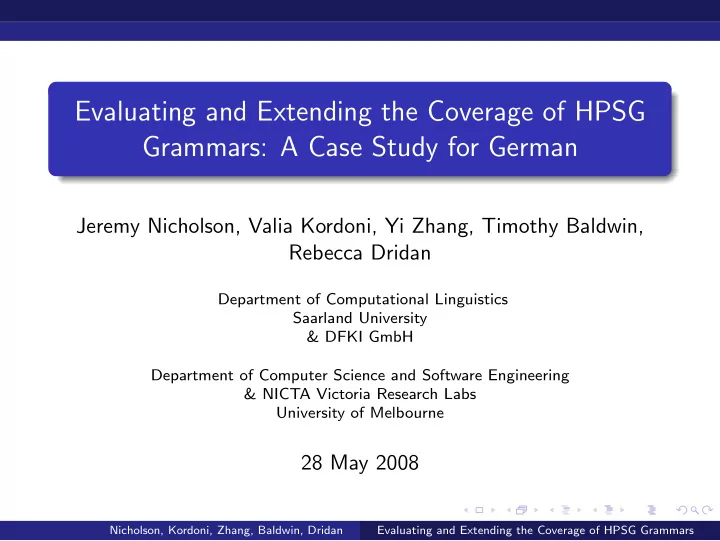

Evaluating and Extending the Coverage of HPSG Grammars: A Case Study for German Jeremy Nicholson, Valia Kordoni, Yi Zhang, Timothy Baldwin, Rebecca Dridan Department of Computational Linguistics Saarland University & DFKI GmbH Department of Computer Science and Software Engineering & NICTA Victoria Research Labs University of Melbourne 28 May 2008 Nicholson, Kordoni, Zhang, Baldwin, Dridan Evaluating and Extending the Coverage of HPSG Grammars
Deep Lexical Grammars Deep grammars provide a full analysis, more semantic information than shallower tools Tendency to emphasise precision over recall can cause poor coverage HPSG grammars, parsing tools from the DELPH-IN initiative Our aim: take a “snapshot” of the grammar, examine potential for expansion Nicholson, Kordoni, Zhang, Baldwin, Dridan Evaluating and Extending the Coverage of HPSG Grammars
Analysis of a “Broad–Coverage” Grammar “Beauty and the Beast” (2004): Use the ERG to parse 20K sentences from the BNC Analyse sources of parse failures “Evaluating and Extending” (Today): Use GG to parse 612K sentences from Frankfurter Rundschau Evaluate errors over 1K sentences Use lexical type prediction to increase coverage Nicholson, Kordoni, Zhang, Baldwin, Dridan Evaluating and Extending the Coverage of HPSG Grammars
Corpus Analysis of the Grammar Ran a large grammar out–of–the–box on a very different corpus Lexical span: ERG - 32%; GG - 28% Sentences with correct reading attested: ERG - 83%; GG - 85% No span Span, no parse ≥ 1 parse ERG 68% 14% 18% GG 72% 16% 12% Nicholson, Kordoni, Zhang, Baldwin, Dridan Evaluating and Extending the Coverage of HPSG Grammars
Lexical Gaps for GG Lexical gaps: Error Type Proportion lexical entries 33% proper nouns 22% noun compounds 30% tokenisation 12% garbage strings 2% Nicholson, Kordoni, Zhang, Baldwin, Dridan Evaluating and Extending the Coverage of HPSG Grammars
Lexical Gaps for GG Lexical entry: Aufgrund des ruhigeren Gesch¨ aftsverlaufs rechnet Maier f¨ ur 1992 mit einem “leicht r¨ uckl¨ aufigen” Ergebnis. Noun compound: Das T¨ urelement l¨ aßt sich hinter die Verkleidung schieben und wird damit unsichtbar. Sophisticated tokenisation could account for proper nouns, noun compounds, tokenisation errors. Nicholson, Kordoni, Zhang, Baldwin, Dridan Evaluating and Extending the Coverage of HPSG Grammars
Parsing Errors for GG Parsing Errors for GG: Error type Proportion constructional gap 39% lexical item gap 47% multi–word expression 7% spelling 4% fragment 3% Nicholson, Kordoni, Zhang, Baldwin, Dridan Evaluating and Extending the Coverage of HPSG Grammars
Parsing Errors for GG Constructional gap: BREMEN, 4. Februar. Lexical item gap: Beginn ist um 19 Uhr in der Stadthalle. Multi–word expression: Der Opfer dieser Verbrechen der Nationalsozialisten gedachte die Stadt Bad Homburg gestern abend. Similar distribution observed in Beauty and the Beast. Nicholson, Kordoni, Zhang, Baldwin, Dridan Evaluating and Extending the Coverage of HPSG Grammars
Lexical Acquisition Baldwin (2005): use a range of morphological, syntactic, semantic features for predicting lexical type class of unknown token/type e.g. Katze in Die Katze ist schwarz. is one of count-noun-le , mass-noun-le , count-noun-mass-unit-le , deverbal-noun-le ... Nicholson, Kordoni, Zhang, Baldwin, Dridan Evaluating and Extending the Coverage of HPSG Grammars
Lexical Acquisition Feature set from Zhang and Kordoni (2006): prefixes/suffixes, 2 tokens of context, 2 types of context Token–wise prediction on the GG treebank (MaxEnt, cross–validation) Limit evaluation to “unknown words” (type–wise) Accuracy approaches 60% Nicholson, Kordoni, Zhang, Baldwin, Dridan Evaluating and Extending the Coverage of HPSG Grammars
Lexicon Extension Using the MaxEnt model from the treebank, predict lexical types for unknown tokens within Frankfurter Rundschau Intrinsic evaluation not possible Thresholding MaxEnt at 10% likelihood, add 1130 lexemes to the lexicon Further 9% coverage, 83% of these had at least one parse Nicholson, Kordoni, Zhang, Baldwin, Dridan Evaluating and Extending the Coverage of HPSG Grammars
Summary Change of 12% of parsed sentences at 85% precision to about 20% at 84% precision This means getting more “easy” sentences Scope for improving the grammar, parsing strategy (shallow methods to improve deep parsing) Nicholson, Kordoni, Zhang, Baldwin, Dridan Evaluating and Extending the Coverage of HPSG Grammars
Recommend
More recommend